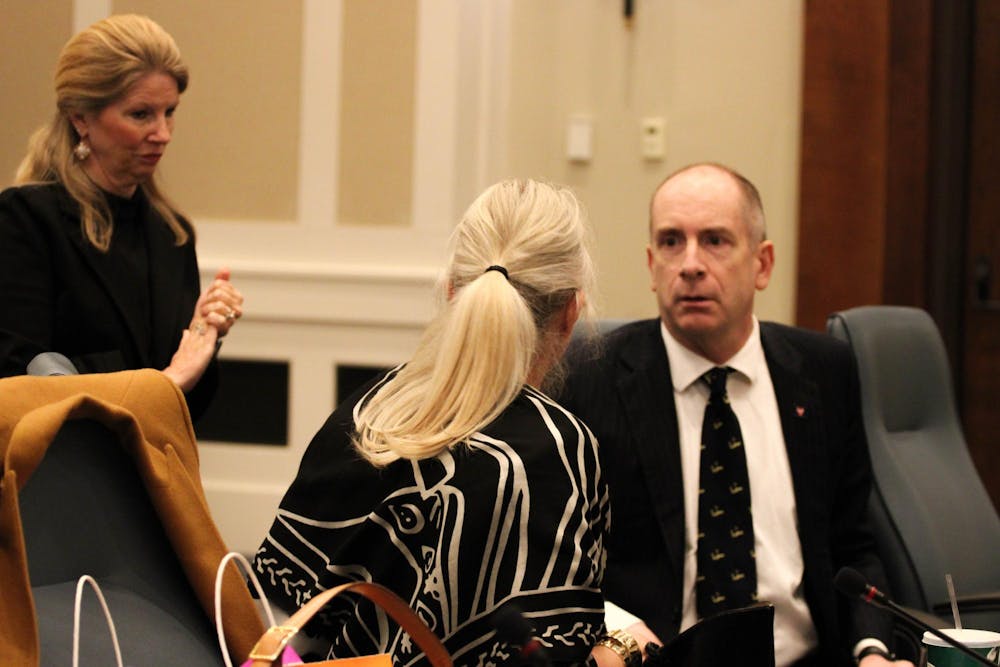The University’s presidential search committee met Oct. 7 to provide updates on the search process for the University’s 10th president. The University is using an outside search firm — Isaacson, Miller — for the search, and John Isaacson, founder and chair of Isaacson, Miller, announced to the committee that a profiling system has been put in place. This system will keep track of the qualities desired from a presidential candidate, and was posted on the search committee website following the meeting.
The search committee is composed of 26 members, all of whom have connections to the University — it was originally composed of 28 before two Youngkin Board appointees were blocked by sate Senate Democrats. Oct. 7’s meeting was held at Boar’s Head Resort and began with a 10-minute open session for the committee and audience to hear updates from Isaacson. This was followed by a closed session of approximately two hours and 30 minutes for the committee to review 30 presidential candidates.
Isaacson said candidates have been both nominated and recruited — through an online application and by reaching out University stakeholders — and that there is an online survey for community members to input the characteristics they hope to see through the next president, which has received over 1000 responses.
Isaacson opened by announcing that Oct. 7’s meeting was not a “decision day” in terms of finalizing any presidential candidate, but rather was intended for committee members to discuss current options. He noted that the search committee is still in the beginning steps of their work.
“Our team sees this moment today as the early-middle phase of the search,” Isaacson said.
Isaacson went on to explain that a “position profile” has been created to assist in the search process. The profile outlines the assets of the University and the challenges that must be addressed by its next president.
“[The candidates] have academic missions, they are aligned with [the University],” Isaacson said. “Our task [as directors], and your task [as the committee], is to persuade these people that in a demanding time with many demanding actors, this is the right place for exceptional people to make the most important move of their career.”
According to the search committee website, the establishment of this profiling system is the last task to be completed as part of phase two of the process, and the committee is now moving into phase three, which will include reviewing candidate applications and conducting interviews.
Immediately before going into closed session for the committee to review over 30 candidates, Isaacson said the search committee is following a “good schedule,” with the timeline of progression going as planned. Updates from the search committee in open session only lasted 10 minutes at Oct. 7’s meeting, which is shorter than the planned 20 minutes in the agenda posted online.
Following the end of the open session, The Cavalier Daily spoke with Ian Mullins, associate professor of sociology and member of American Association of University Professors, who was present in the audience beside other AAUP members.
Mullins said he has been following the presidential search from the “beginning,” when former University President Jim Ryan announced his resignation June 27. Mullins emphasized his objection to the search committee, in both the members that are a part of the committee and the way the search process has gone thus far.
“[The search committee] violates principles of shared governance that are essential to U.Va,” Mullins said.
Mullins also said he has attended every presidential search committee so far and that Oct. 7’s open session — only being 10 minutes — did not reveal much information.
“It’s a very closed off process and it’s difficult to know what’s going on in that room,” Mullins said. “Because the committee was constituted in an unrepresentative way, it’s hard to trust what’s [being done].”
University Spokesperson Brian Coy has previously told The Cavalier Daily that of the 26 members that make up the search committee, five are “student representatives” — Gregory Perryman, student representative of the Board of Visitors and fourth-year College student, Quana Dennis, class of 2023 and 2024 alumnus and doctoral student, current graduate student Dr. Babur Lateef, Gretchen Walsh, former student-athlete and class of 2025 alumna, and Kenyon Bonner, University vice president and chief student affairs officer.
However, Perryman is the only current undergraduate of these five student representatives, and only three of the five are active students. Of the other 21 members of the committee, 10 are also Board representatives. The AAUP has spoken out against the search committee, as well as the University Faculty Senate and Student Council, which both voted no confidence in the Board in July and August — respectively — due to what they said was a lack of faculty and student representation on the committee.
The search committee will meet again Nov. 3, and Isaacson said that at this time, in-person interviews with a smaller pool of candidates will begin taking place.







